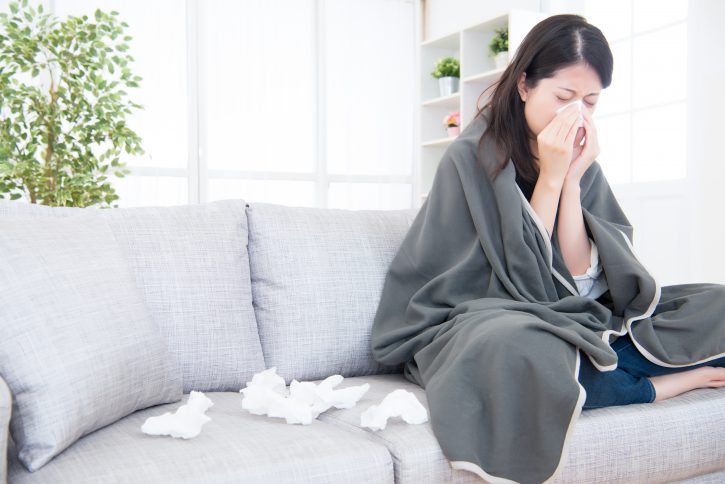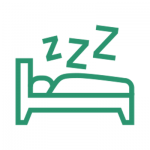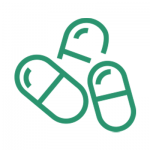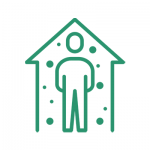
Caring for Yourself When Sick
Article originally published December 18, 2020.
Article updated August 30, 2021
While the SARS-CoV-2 virus may cause serious illness and life-threatening complications in some, many of those infected will recover at home after experiencing mild to moderate symptoms. But even the less severe cases of COVID-19 can be miserable, and knowing how to care for yourself when sick can go a long way in aiding your recovery.
Follow these tips to better manage your illness at home:
 Rest, Rotate and Repeat
Rest, Rotate and Repeat
When you’re feeling your worst, staying in bed will likely be a no-brainer. As you work toward recovery, however, it’s important that you avoid lying on your back, especially if you are experiencing shortness of breath. This position can keep the lungs from expanding, making it difficult for your body to get the oxygen it needs. Instead, try rotating between sitting up, resting on your stomach, and flipping to either side.
Resting Positions
- Rest on your belly for 30 minutes to 2 hours
- Rest on your right side for 30 minutes to 2 hours
- Sit up for 30 minutes to 2 hours (If you are in a recliner, remain in a sitting position. Do not lie back.)
- Rest on your left side for 30 minutes to 2 hours
- Return to resting on your belly and repeat the process
This cycle of positions can help get air into all areas of your lungs, increasing comfort and promoting oxygenation.
 Breathe and Move
Breathe and Move
While you are awake, make a dedicated effort to get up and walk every 20 minutes. If you’re watching TV, get up and move during commercial breaks. You can also practice better breathing by doing the following exercise several times an hour.
Breathing Exercise
- Breathe in slowly through your nose
- Hold your breath to the count of five
- Breathe out through your mouth with lips slightly closed
- Repeat five times an hour while awake
 Stay Hydrated and Well-Nourished
Stay Hydrated and Well-Nourished
With any illness, including COVID-19 and the flu, it’s important to stay hydrated. Drink plenty of fluids – including water and beverages with electrolytes, such as Pedialyte, Gatorade Zero and Powerade Zero – to avoid dehydration and replace the moisture you’ve lost due to fever, diarrhea and mucus production or drainage. Beverages should be consumed at room temperature or warmed.
If your appetite is poor or you are having a hard time eating due to shortness of breath, consider trying a nutrition supplement drink – such as Ensure or Glucerna – to help meet your body’s needs.
 Management with Medications and Supplements
Management with Medications and Supplements
If you are experiencing fever, body aches and other uncomfortable symptoms, use over-the-counter medications to alleviate your discomfort.
- Tylenol can help reduce fever and relieve muscle and joint pain
- Mucinex and Mucinex DM may be helpful for managing drainage and coughing
- One baby aspirin each day can help prevent the formation of blood clots, which can occur with low activity
- Consider taking supplements to support your immune system, including vitamins C, D3, B, zinc and probiotics
These recommendations are not intended to replace information from your healthcare provider. If you’re uncertain whether these medications and supplements are right for you, speak with your primary care provider.
 Self-isolate to Protect Others
Self-isolate to Protect Others
If you live in a household with others, self-isolating can help reduce the spread of COVID-19. This goes beyond staying home when sick, and includes sticking to your own “recovery room,” avoiding common spaces (like the kitchen and living room) and eliminating the sharing of common household items, such as dishes and bedding. When you must be around others, wear a mask to reduce the spread of germs.
Even if you’re feeling better, review the CDC’s guidelines on ending isolation protocol before leaving your home or interacting with others.
 Notify Close Contacts
Notify Close Contacts
People with COVID-19 can be contagious for up to 48 hours before they begin showing symptoms or receive a positive test result. If you’ve been diagnosed with COVID-19, reach out to anyone that may be considered a close contact to alert them of their possible exposure.
“Close contacts” originally included anyone that you spent 15 minutes or longer with while being within 6 feet of one another, but as the coronavirus has become more infectious and transmissible with the appearance of the Delta variant, it is important to reach out to individuals that you had brief encounters with as well.
By beginning your own contact tracing, you can help prevent the spread and save lives.
Stay Connected to Your Healthcare Team
Remain in close contact with your healthcare team. Giving your healthcare provider updates throughout your illness can help you navigate the road to recovery together. It’s critical that you follow the advice of your physician and seek medical care whenever necessary. If you do leave your home to seek medical attention, wear a mask and do your best to avoid public transportation, like buses, taxis and rideshare services.
Call 911 or go to the emergency room if you or a loved one are experiencing any of the following associated with COVID-19:
- Difficulty breathing
- Confusion
- Inability to wake or stay awake
- Bluish lips or face
- Persistent chest pain or pressure
